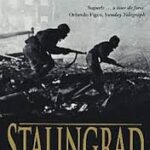by Anthony Beevor
 The general consensus regarding Stalingrad seems to have been largely summarised by Jim – thanks again for sending in your thoughts, your participation from a distance well appreciated. There was a mixture of appreciation from a general sense of the deep tragedy of war on both sides and the extremely drawn out sense of tremendous hardships endured – let alone a slow lingering death. Beevor did a superb job of capturing this along with attempting to give a higher level sweep of the strategic moves of the ‘battle/campaign’ itself. Where there seemed to be some criticism it revolved around a possible lack of continuity in the individual recording of experience where he dipped in and out of first-hand account seemingly depending on availability of recollections and his access thereto as well as conveying a sense that I am throwing this in just to show how deep my research has been. This is possibly an unfair criticism as all agree the work is a superb piece of research and he does manage to put it all together in a cohesive way. There was a question of whether this work stands up to his other works, and similarly whether he was targeting too broad an audience and therefore tended to sway between a very pointed military -informed narrative relying on reference to the order of battle supplied to something more akin to the band of brothers/Stephen Ambrose series of conjoined narratives resting on personal experience outside of the strategic recounting. Although felt that they are happy to have said they read it and that it can be added to the lists of accomplishments, with varying degrees of overall appreciation of time spent. Hopefully, I have captured some sense of the essence of our discussion…much left unrecounted.
The general consensus regarding Stalingrad seems to have been largely summarised by Jim – thanks again for sending in your thoughts, your participation from a distance well appreciated. There was a mixture of appreciation from a general sense of the deep tragedy of war on both sides and the extremely drawn out sense of tremendous hardships endured – let alone a slow lingering death. Beevor did a superb job of capturing this along with attempting to give a higher level sweep of the strategic moves of the ‘battle/campaign’ itself. Where there seemed to be some criticism it revolved around a possible lack of continuity in the individual recording of experience where he dipped in and out of first-hand account seemingly depending on availability of recollections and his access thereto as well as conveying a sense that I am throwing this in just to show how deep my research has been. This is possibly an unfair criticism as all agree the work is a superb piece of research and he does manage to put it all together in a cohesive way. There was a question of whether this work stands up to his other works, and similarly whether he was targeting too broad an audience and therefore tended to sway between a very pointed military -informed narrative relying on reference to the order of battle supplied to something more akin to the band of brothers/Stephen Ambrose series of conjoined narratives resting on personal experience outside of the strategic recounting. Although felt that they are happy to have said they read it and that it can be added to the lists of accomplishments, with varying degrees of overall appreciation of time spent. Hopefully, I have captured some sense of the essence of our discussion…much left unrecounted.
Our fiction choice for the next read is the Pulitzer prize-winning ‘Orphan Master’s Son‘ by Adam Johnson.
From our Correspondent:
Finished “Stalingrad” so here are a few notes for the club (you can send these round if it’s worth it).
Overall, underwhelmed by the book. Largely a recitation and for me didn’t really get going or gripping until the final few pages.
Great detail, but had the impression that this was brought out to demonstrate how much he’d done and how clever he was rather than to make the book more interesting or captivating. Thought also the detail in first few chapters confusing (especially with Kindle maps!!!) and stopped me developing any sort of flow or connection with the book.
Thought it lacked focus, though there was some attempt to centre it on Paulus, although I ended up knowing or understanding no more about him at the end than after the first couple of appearances.
The day-by-day structure was logical but I felt it worked against trying to get any deeper into topics. E.g. Lots of quotes from soldiers (on both sides) but never really built into anything more substantial than transient impressions. Likewise for tactics, logistics, Hilter/Stalin etc.
Day-by-day only really works if you don’t know what happens at the end, so can’t understand why he didn’t try for more synthesis. As far as scholarship goes, digging out new facts is (comparatively) easy: the hard part is putting them together to give a new understanding and I didn’t think I got this from the book.
A ‘worthy’ book and one which I’m glad to be able to say I’ve read, although I’m not sure I can say I’m glad I’ve read it (if you understand the distinction I’m trying to make).
